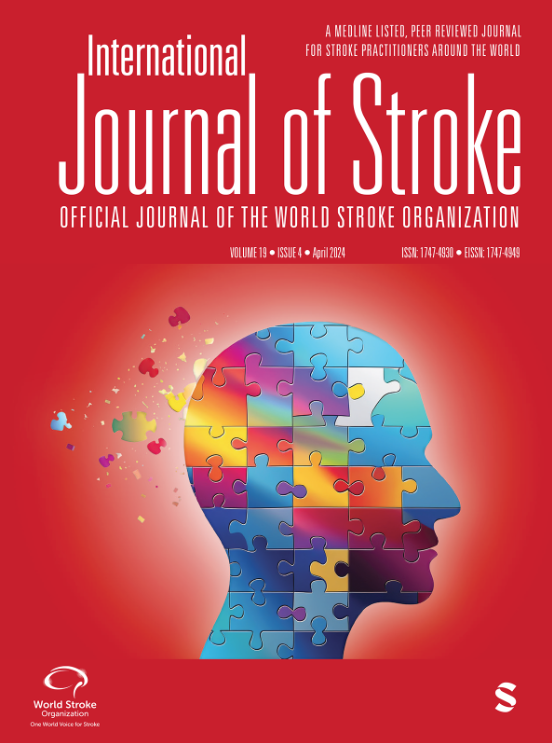The effect of body mass index on stroke prognosis: a systematic review and meta-analysis of 32 cohort studies with 330353 patients
IF 8.7
2区 医学
Q1 CLINICAL NEUROLOGY
引用次数: 0
Abstract
Background:Many studies have explored the impact of body mass index (BMI) on stroke prognosis, yet findings remain inconsistent.Aims:The aims of this study were to conduct a systematic review and meta-analyses to summarize the existing evidence on BMI and stroke outcomes.Methods:PubMed, Web of Science, Embase, The Cochrane Library, CNKI, CBM, Wanfang Database and VIP Database were systematically searched from inception to Jan.1st, 2023. Cohort studies were included if they reported on a population of patients with stroke, evaluated BMI on stroke outcomes (mortality/recurrence/score of mRs) and reported original data. Data extraction and quality assessment were independently undertaken by two reviewers. Stata 16.0 software was used for meta-analysis.Results:32 studies involving 330,353 patients (5 Chinese language articles) were included in the analysis. The proportion of underweight, overweight, and obese patients was 1.85%, 18.2%, and 15.6%, respectively. Compared with normal weight, being underweight was associated with an increased risk of mortality (RR 1.78, 95% CI 1.60–1.96), poor functional outcomes defined as modified Rankin scale ≥3 (RR 1.33, 95% CI 1.22–1.45), and stroke recurrence (RR 1.19, 95% CI 1.04–1.37). Being overweight but not obese was associated with reduced mortality (RR 0.81, 95% CI 0.74–0.89) and better functional outcomes (RR 0.92, 95% CI 0.89–0.96), but did not alter the risk of stroke recurrence (RR 1.03, 95% CI 0.90–1.17). Obesity was associated with lower risk of mortality (RR 0.76, 95% CI 0.72–0.81), and better functional outcomes (RR 0.89, 95% CI 0.84–0.94).Conclusions:Our findings indicate that in patients with stroke, being underweight is associated with an increased risk of mortality, poor functional outcomes, and stroke recurrence. In contrast, being overweight but not obese, or being obese, was associated with a decreased risk of mortality and better functional outcomes. This are consistent with the obesity paradox in stroke, whereby obesity increases stroke risk in the general population but is associated with improved outcome in patients suffering stroke. Key Words body mass index; stroke; prognosis; meta-analysis体重指数对中风预后的影响:对 32 项队列研究(共 330353 名患者)的系统回顾和荟萃分析
背景:许多研究探讨了体重指数(BMI)对卒中预后的影响,但研究结果仍不一致。研究目的:本研究旨在进行系统综述和荟萃分析,总结有关体重指数和卒中预后的现有证据。方法:系统检索了从开始到 2023 年 1 月 1 日的 PubMed、Web of Science、Embase、The Cochrane Library、CNKI、CBM、万方数据库和 VIP 数据库。如果队列研究报告的对象是脑卒中患者,评估了 BMI 对脑卒中结局(死亡率/复发率/mRs 评分)的影响,并报告了原始数据,则纳入该研究。数据提取和质量评估由两名审稿人独立完成。结果:共纳入 32 项研究,涉及 330,353 名患者(5 篇中文文章)。体重不足、超重和肥胖患者的比例分别为 1.85%、18.2% 和 15.6%。与正常体重相比,体重不足与死亡率(RR 1.78,95% CI 1.60-1.96)、功能障碍(定义为修正的 Rankin 评分≥3)(RR 1.33,95% CI 1.22-1.45)和卒中复发(RR 1.19,95% CI 1.04-1.37)的风险增加有关。超重而不肥胖与死亡率降低(RR 0.81,95% CI 0.74-0.89)和功能预后改善(RR 0.92,95% CI 0.89-0.96)相关,但不会改变卒中复发风险(RR 1.03,95% CI 0.90-1.17)。结论:我们的研究结果表明,在卒中患者中,体重过轻与死亡率、功能预后差和卒中复发风险增加有关。相比之下,超重但不肥胖或肥胖与死亡风险降低和功能预后改善有关。这与中风中的肥胖悖论相一致,即肥胖会增加一般人群的中风风险,但与改善中风患者的预后有关。关键词 体重指数;中风;预后;荟萃分析
本文章由计算机程序翻译,如有差异,请以英文原文为准。
求助全文
约1分钟内获得全文
求助全文
来源期刊

International Journal of Stroke
医学-外周血管病
CiteScore
13.90
自引率
6.00%
发文量
132
审稿时长
6-12 weeks
期刊介绍:
The International Journal of Stroke is a welcome addition to the international stroke journal landscape in that it concentrates on the clinical aspects of stroke with basic science contributions in areas of clinical interest. Reviews of current topics are broadly based to encompass not only recent advances of global interest but also those which may be more important in certain regions and the journal regularly features items of news interest from all parts of the world. To facilitate the international nature of the journal, our Associate Editors from Europe, Asia, North America and South America coordinate segments of the journal.
 求助内容:
求助内容: 应助结果提醒方式:
应助结果提醒方式:


